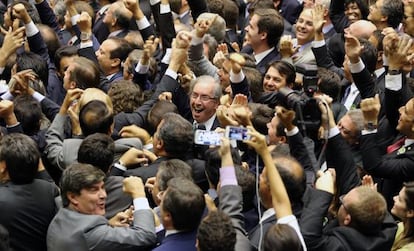Brazil’s Rousseff suffers first blow as lower house elects conservative chief
New president of Chamber of Deputies has opposed many bills proposed by administration


Brazilian President Dilma Rousseff suffered the first great defeat of her second term on Sunday, when Eduardo Cunha, an old adversary of the current administration, was elected president of the Chamber of Deputies during the first session of the new Congress.
Cunha, of the Brazilian Democratic Movement (PMDB), received 267 votes in the first round, ten more than he needed to win. During his campaign, the congressman stressed separation of powers, especially between the legislative and executive. The PMDB is a government ally in the ruling coalition, but Cunha has personally opposed many of Rousseff's policies.
Despite this setback, Rousseff’s Workers Party (PT) did get a consolation prize because its candidate for Senate president, Renan Calheiros (PMDB), secured easy re-election.
Cunha challenged Rousseff during the exhausting vote on new port regulations in 2013
After his victory was announced, Cunha said he would work for everyone and that he harbored no resentment despite “the executive’s attempt to intervene” in congressional elections.
“We have no desire for reprisals. It was a very close race, but the people made it very clear that they want a parliament that is independent [from the executive]. This [chamber] is where necessary debates should and will take place no matter what. We never said we would be confrontational, but we did say that we would not be submissive either, and we will not be.”
The new speaker of the lower house, who opposed the Rousseff administration during the exhausting vote on new port regulations in 2013, now has the power to decide what ends up on the voting floor. Though he is a member of the administration’s coalition, Cunha is no ally of the president and could make trouble for her if he supports bills that force the administration to increase spending – especially this year, when the government is hoping to make some budget adjustments.
Rousseff and Cunha have also clashed over regulation of state-owned oil firm Petrobras. Cunha has stated that he favors greater oversight of the company, while he rejects further regulation of the media, a proposal that the Workers Party (PT) has been trying to pass for years.
There is also a slight chance that Cunha might back an impeachment process in response to the Petrobras scandals, although so far he has said he has no intention to do so. In any event, Rousseff will have to win his support in order to pass some of her legislative proposals.
Cunha, who carried out an intense campaign, defeated PT candidate Arlindo Chinaglia, who received 136 votes, and Brazilian Socialist Party (PSB) contender Júlio Delgado, who took third place with 100 votes. The Socialist Chico Alencar received eight votes.
The fight for the Senate
As expected, Renan Calheiros was re-elected Senate president with 49 votes. His only rival, fellow PMDB member Luiz Henrique, pulled in 31 votes. The winning senator, who remained faithful to Rousseff during her first term, will try to limit Cunha’s rebellion in the lower house as much as possible.
Calheiros said his party would “also work for economic stability.” “Decisions will be made collectively and they will never be monocratic, as they have never been. We are going to build as much consensus as possible.”
Calheiros said there was “a lot to do” and promised to “personally” push for political reform. He has also announced plans to meet with Cunha on Monday to fine-tune a common agenda so that the legislative process “will help improve the business climate” in the country.
Translation: Dyane Jean François
Tu suscripción se está usando en otro dispositivo
¿Quieres añadir otro usuario a tu suscripción?
Si continúas leyendo en este dispositivo, no se podrá leer en el otro.
FlechaTu suscripción se está usando en otro dispositivo y solo puedes acceder a EL PAÍS desde un dispositivo a la vez.
Si quieres compartir tu cuenta, cambia tu suscripción a la modalidad Premium, así podrás añadir otro usuario. Cada uno accederá con su propia cuenta de email, lo que os permitirá personalizar vuestra experiencia en EL PAÍS.
En el caso de no saber quién está usando tu cuenta, te recomendamos cambiar tu contraseña aquí.
Si decides continuar compartiendo tu cuenta, este mensaje se mostrará en tu dispositivo y en el de la otra persona que está usando tu cuenta de forma indefinida, afectando a tu experiencia de lectura. Puedes consultar aquí los términos y condiciones de la suscripción digital.







































